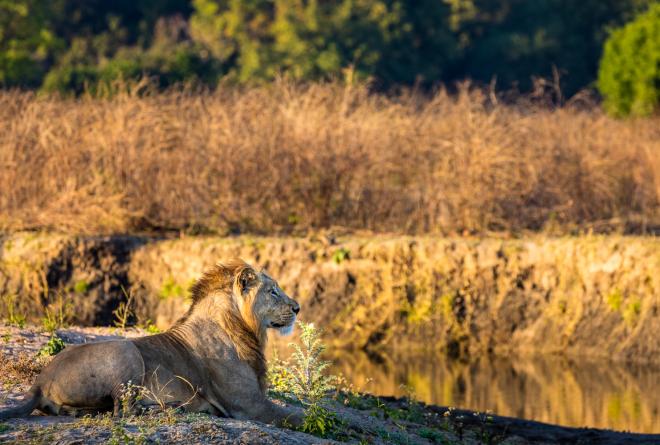Majete Wildlife Reserve: restoring nature and securing local jobs
A nature conservation initiative in Majete Wildlife Reserve in Malawi is providing sustainable jobs for local people – and helping the communities’ youngsters to know what a tall tree or an elephant looks like, for the first time in their lives.
For young people growing up on the fringes of the Majete Wildlife Reserve in southwestern Malawi, the sight of a tall-growing tree or an elephant used to be something from the picture books, not something they experienced in their daily lives. Trees were cut down before their prime, for use in making charcoal, and elephant populations were wiped out, as a result of poaching and loss of forest habitat.
Now all that has changed, as a conservation initiative has restored the natural environment to health – and has created reliable, skilled jobs for community members, too.
The initiative by African Parks, now funded by the UK government under the Building Resilience and Adapting to Climate Change programme, is demonstrating how wildlife conservation can pay for itself many times over, via green jobs and a thriving ecosystem.

Majete Wildlife Reserve: recreating wild nature
The Majete Wildlife Reserve was a ‘failing’ wildlife reserve in 2003, when African Parks took over its management. Trees had been widely felled for use in charcoal production. Wildlife had been ‘hunted out’ of the degraded habitat – elephants, rhinos, lions, buffalo, even warthog. “Only a few antelope remained,” according to African Parks, and “not a single tourist had visited in three years.”
“There was no tourism before African Parks,” said John Njunga, Project Officer. “All these people you see visiting the park today are here because African Parks brought back all these animals. Before African Parks, no one would come to Majete to see animals because there was nothing.”
It has taken steady work over the intervening 18 years, but gradually, investment in Majete Wildlife Reserve has restored the mix of habitats, including restoring a thriving forest ecosystem. Species reintroduction schemes have brought back mega-fauna like the elephants, which are a draw for international and domestic visitors alike.
In recent years, major translocations to Majete included; four lions in 2018 to bolster population numbers and genetics, a founder population of 13 giraffes in 2018, and five cheetahs in 2019 which were reintroduced after decades of their absence.
“Because tourism is growing in Majete lots of Malawians are being employed such as game rangers, fence attendance, drivers, guides etc.,” said Mr Njunga.
African Parks secured the boundaries of the park with rangers to guard against poaching, and started working very closely with the communities – not just to set up jobs, but also to establish a scholarship programme to provide school fees for local children who otherwise may not have had the opportunity to attend school. In 2019, 107 secondary school and university students were provided with scholarships. African Parks is also helping build a hospital close to the village so that people no longer have to walk a long way to get access to healthcare.
Green jobs – through the eyes of the Mpakati Family
Henry Mpakati (27), his wife Mariesta (22) and their two children Martha (4) and Mike (1 month, above) live in one of the villages closest to Majete Wildlife Reserve. Mr Mpakati has recently been promoted to Tourism Assistant at Majete. The family has now benefits from a steady income thanks to his work. In fact, it has been a life-saver for them.
Mr Mpakati’s parents originally worked as subsistence farmers in the area. This was difficult, back-breaking labour, but it paid off, at least until 2009, when the rains began to fail. From then on, subsistence farming became increasingly inadequate to feed their family.
“They used to have good rainfall but from 2009 the rains didn't come as they used to which meant there was not enough food for the family, let alone extra to sell,” John Njunga reported.
Mr Mpakati counted himself fortunate that his parents could afford the fees for him to complete secondary school, although they could not afford to send him to university – a source of regret. After school, life was very hard in the village because there were few employment opportunities. This made it challenging to survive. Mr Mpakati was unable to find full-time work and often took on contract work in construction or buying cotton. However, as he was not working all the time, he had to find another way to make an income. He would harvest trees to make charcoal, which he would then sell in Blantyre.
“There was nothing I could do during that time so for me to survive. I had to do whatever I could as it was a hard life," Mr Mpakati laments. To make charcoal isn't easy - he explained. “After making the charcoal one would have to walk to Blantyre which took up to 12 hours. One would leave at 6am and by 6pm you would find somewhere to sleep so that you could wake up at 1am to make it to the market by 6am to sell your charcoal. Although there was high demand during the rainy season, one still didn’t get much money from the sale as one bag could cost 6,000 Kwacha ($8).”
Mr Mpakati’s fortunes took a change for the better in 2014-15. That is when he returned to his home village and met his wife Mariesta. She was from a poor family, as her father died when she was young, and her mother had to scrape by with little income. She had to drop out of school after Standard 5, as her mother explained that if she went to school, the family would have nothing to eat.
The couple married, and the newly-wed Mrs Mariesta Mpakati returned to school at her husband’s urging, at the age of 21. Here she excelled. Although she did not finish her exams due to her pregnancy with their first-born child, she still has enthusiasm to continue her studies later.
In 2015, Mr Mpakati saw an advert for a job at Majete's Community Campsite and was employed as the Community Campsite Attendant. Four years later, he was promoted to Tourism Assistant. Since he started working for Majete Wildlife Reserve “everything has improved,” he reports.
Mr Mpakati is now able to help his family, his parents and help pay for his sister's schooling. Comparing his life now to when he sold charcoal, he says that he can afford a better life, with his own house, four goats, pigeons, guinea fowls and a cow. Although it has taken time, the steady income has produced a very big improvement in their living standards.
“It is not only Henry’s life which has improved as a result of the community campsite,” reports John Njunga. “All the money generated from the campsite is reinvested in the community. Each year the campsite generates 11-12 million kwacha and the community decides where they need the most help.”
“The community is aware of the benefits as many people from the surrounding areas are employed by the park. The parents and families of these individuals experience the direct benefits and know that without African Parks they wouldn't have seen these benefits. African Parks also organises visits to the park for local schools.”
”If the community comes to the park to admire the wildlife, then they can spread the good news in their home and more people can come to Majete and little by little the tourism revenue can grow,” said Mr Mpakati.
“In the future, I hope to get my driver's license so that I can become a tourism guide and teach people about the wildlife in Majete Wildlife Reserve.”
He has a passion for wildlife and is an avid birder who taught himself the different names and sounds of Majete's birds. “Majete is special because it was a park that had nothing and now has lots of animals - so many that we could even move 154 elephants to other parks in Malawi. Today Majete looks after the wildlife for us, so we have that advantage to see them and we should help to protect and conserve.”
Story courtesy of John Njunga, African Parks, with contributions by Mairi Dupar, BRACC Hub.
